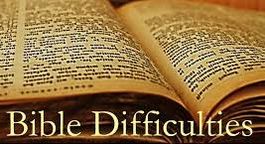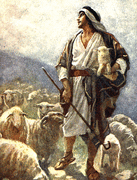 Lovin’ Leviticus, part 1 “Have you ever survived reading through Leviticus?” That is a question that is passed around by people when they are encouraged to read through the entire Bible. It is an unfortunate question though, because it approaches the book from the standpoint that everything in Bible reading needs to have a story – or be exciting. If it is not – then maybe it is something we should set aside for the theologians or for Bible nerds who like that kind of stuff. Leviticus is part of a progression in God’s revelation of Himself. Whether we realize it first or not, without Leviticus we are going to miss and very important part of that revelation. Let me explain and hopefully give you some encouragement as we read this book together over the next couple of weeks. Leviticus is the third book in the series of books that God had Moses give us as in His revelation of Himself. Genesis is a book of beginnings as well as a book that helped us to understand the problem mankind faces in approaching and knowing God. That problem is sin – and in Genesis we are exposed to how sin came into humanity and the extent to which it prevents us from having an ability to approach and know God. We are also introduced to God’s remedy for sin, the Seed of the woman (Jesus). Exodus is a book of deliverance as God recused a people from slavery. The key to the book is how we have been brought near to God through the blood of the lamb slain for us (Jesus). That is seen in the Passover as we are introduced to how a blood sacrifice delivers us from dead. Leviticus takes us further in the revelation of God – and is absolutely vital in helping us understand Who God is. When God revealed Himself to us in Exodus He is the God who dwelt on a mountain covered in fire. He was a God who was up there – apart from us. But by the end of the book God has provided a place here among us where we can approach Him – the Tabernacle. By the end of Exodus the Tabernacle is in place and becomes the place where mankind can approach God. Salvation came through the Paschal Lamb, but now we are taught to understand how we can fellowship with God through the blood that provides forgiveness of sins. This is where Leviticus takes up God’s revelation of Himself and does so by helping us understand two important things. Here we are introduced to the holiness of God as well as the sacrifices that bring us near Him. In understanding the types that are in Leviticus we are given a wonderful unfolding of the sacrifice of Christ in all of its many-sided facets. Each of these sacrifices has a meaning for us – and all point to Jesus and what He will do for us by His death on the cross. As God reveals the way of fellowship to us through Leviticus we are brought to two main realities. First is the “Ground of Fellowship” which we learn is the sacrifices. These sacrifices are given in two types – those that are voluntary and those, which are mandatory. The voluntary ones reveal how Christ was a sweet savor to God – whereas the non-voluntary ones are how Christ brings us to God. Before the first section is finished – we are presented with the sacrifices, the priesthood, and the altar that allows us to have fellowship with God. The second half of Leviticus presents to us the “Walk of Fellowship” which involves a separation to God. This is where we come to understand that God calls us with a holy calling – to be a people holy and separated unto Him. This is where we will be confronted with what God considers holy and what He reveals to be sin. We will also be reminded that sin requires punishment. In the New Testament we will learn that Jesus Christ has taken this punishment for us so that we can be a people separated unto God – so that we can be holy as He is holy. What we have before us is a book that will present to us both God’s Way and Walk of Fellowship. It is given to us in basic colors that will leave us with the basic impressions that God is holy, we need a blood sacrifice to bring us near to Him, and that fellowship with Him will involve being made a people who embrace and walk in holiness before Him. It is my hope that in understanding these basics about Leviticus that we can not approach this reading with a sense of dread and fear – but rather that we will be “lovin’ Leviticus” as we read through this very important part of God’s revelation of Who He is.
0 Comments
 Today in our reading for “The Disciple’s Journey” we read from 2 Kings 19 about the invasion of Judah by Rabshakeh for Sennacherib, the king of Assyria. When he came to Jerusalem, Rabshakeh decided to mock and deride not only Judah, but also Hezekiah and his strong faith in Jehovah. That was a very serious mistake. Hezekiah showed wisdom in not responding to the Assyrian leader when he spoke blasphemously against God. He instead went with the letter into the presence of God and prayed with great sorrow and grief about how God was dishonored by this arrogant official of Assyria. He spoke of God’s sovereignty and power – and how that was denigrated by the words which Rabshakeh spoke. Then God spoke on the matter. The words which God said were truly terrifying when you consider what happened shortly after God spoke them through His prophet Isaiah. 'But I know your sitting down, And your going out and your coming in, And your raging against Me. 'Because of your raging against Me, And because your arrogance has come up to My ears, Therefore I will put My hook in your nose, And My bridle in your lips, And I will turn you back by the way which you came. 2 Kings 19:27-28 Those are sobering words for God to speak. In them God makes it clear that He is both omniscient and omnipotent. He is omniscient for He knows the sitting, the coming, the going, and the raging of the king of Assryia. Nothing has escaped God’s notice. He has seen the dishonor and disrespect of this ungodly king and his general. Before the night is over – 185,000 of his men – actually according to Chronicles – the entire leadership of the army (for those killed were all the officers of the army of Assyria) was killed. They awoke to see their entire officer corps become their officer corpses. They did the only thing they could do – turn and go home just as God’s prophet declared. And awaiting this arrogant king was a judgment of his own. He too was killed due to a plot against him within his own house – again – just as God said. God’s description of how He will deal with this arrogant general and king are very clear. God is about to put a hook in the nose of these arrogant men. The kind of hook here is a piece of metal that was driven through the nose and then attached to a chain by which the prisoner was led around. Since we live in a day when a nose ring is often seen as a piece of jewelry - it might be wise to think of this ring in terms of what they put into the nose of a cow to lead it about when it is particularly unruly. God also promised a bridle in the lips. This was a piece of wood or steel that was usually put in the mouth of horses and attached to reins by which the master could turn the head and direction of the animal quickly. To resist the bridle was very painful. So this proud king and general who would do whatever they wanted – even to God’s people – were about to be led about with a hook through the nose and a bridle in their proud mouths. One would have to admit this was a very humbling way to be led about. Yet it is a warning to all who would dare think they will run their lives however they want – and God has no control over them. His lack of immediate action is mercy – and the arrogant would be wise to see such kindness by God as a call to repentance and not as a vote for them to continue in their rebellion. Far too often the rulers of this world think they can rebel against God and do anything they want. Yet it is here – and also in Psalm 2 – and in Psalm 75 that we read of the “real facts.” God is King and God is Judge. He is the One Who knows all – and who has the power in His omnipotence to act in keeping with His righteousness and holiness. For those of us in power – not only over entire nations, but also when we are foolish enough to think we have power over our own lives – this is something to remember – and honestly – to tremble about as we consider our own arrogant statements of what “we will do with our own lives.” There is One God – One Creator – One Owner – and One Judge over all. Jehovah is that One, and it would be wise for us to remember that whenever we wrongly think we are sovereign and can do whatever we want.  It is a foolish thing to try to hide from a blind man. That almost sounds like a foolish statement in itself, doesn't it. Hiding from a blind man should be easy. But when that blind man is a prophet of God, the possibility of hiding becomes impossible. That is what Jeroboam and his wife learned the hard way. Ahijah had a somewhat limited ministry as a prophet of God. He was the one God sent to Jeroboam to tell him about how the LORD was going to make him king of 10 of the tribes of Israel. But soon after he gave this prophetic word to Jeroboam and it came to pass - Ahijah was left out of the kingdom and its ways. Jeroboam decided that God's promise to make him king was not true - and that rather than possibly lose "his kingdom" (actually it was God's kingdom entrusted to Jeroboam) by having the people continue to worship God in Jerusalem - he would make his own gods. From that moment until God confronted Jeroboam, Ahijah was puhsed out of the way. "Why would my kingdom need a prophet of Jehovah now," Jeroboam thought. But the day came when Jeroboam needed a true prophet of God. The day when his son was very sick. But he didn't want to humble himself before God to ask - so he decided to disguise his wife to go ask. She would take a present with her to give to the prophet - and then ask if her son would live. No one needed to know it was the king's son - they just needed information. What a disconcerting thing it must have been for the queen to have Ahijah greet her when she came to him. "Come in, wife of Jeroboam, why do you pretend to be another woman? For I am sent to you with a harsh message." Even more difficult for her was to hear the message that God had for her husband who thought that he could hide from God's prophet - and honestly - who must have also forgotten that He could not hide from God either. Here was the message God had for this king who preferred a god of his own making rather than the living and true God. "Go, say to Jeroboam, 'Thus says the LORD God of Israel, "Because I exalted you from among the people and made you leader over My people Israel, and tore the kingdom away from the house of David and gave it to you—yet you have not been like My servant David, who kept My commandments and who followed Me with all his heart, to do only that which was right in My sight; you also have done more evil than all who were before you, and have gone and made for yourself other gods and molte n images to provoke Me to anger, and have cast Me behind your back—therefore behold, I am bringing calamity on the house of Jeroboam, and will cut off from Jeroboam every male person, both bond and free in Israel, and I will make a clean sweep of the house of Jeroboam, as one sweeps away dung until it is all gone. Anyone belonging to Jeroboam who dies in the city the dogs will eat. And he who dies in the field the birds of the heavens will eat; for the LORD has spoken it. Now you, arise, go to your house. When your feet enter the city the child will die. All Israel shall mourn for him and bury him, for he alone of Jeroboam's family will come to the grave, because in him something good was found toward the LORD God of Israel in the house of Jeroboam. 1 Kings 14:7-13 (NASB) Jeroboam, who thought he could "pull one over" on the blind prophet of Jehovah - quickly learned that the only blind people involved in this situation were him and his wife. They had turned a blind eye to the Word of the Lord - deciding that the whole theological future of Israel involved nothing more than which "god" they would decide to make to secure the kingdom for themselves. What they learned is that the kingdom never belonged to them. They were simply given stewardship over it by God to rule it for the honor and glory of God. They also learned that they had far worse problems than a sick son. Their lives were so ungodly that God was going to take the boy to Himself so that they would not destroy him with their ungodly living and teaching. In Him alone was there found something good in the house of Jeroboam - and God was going to reclaim him before that was erased by the ungodly influence of his father. But Jeroboam's wife - and then Jeroboam himself - were about to learn that God's eyes had not been blind to what was happening in Israel. He knew about their unfaithfulness to Jehovah. He knew about their idolatry. He knew everything - because that is the funny thing about an omnisicient God - He does know everything. He sees even though His prophet may be nearly blind. So what do we take away from this historical account? First we need to learn it is the height of foolishness to play "hide-and-go-seek" with God. He sees you - and He will not only know where you are physically hiding (honestly Adam and Eve in the garden should have taught us that already) but he knows everything you think you are hiding from Him in your heart. That is where things get very scary for us. You see the second thing we need to understand is that God knows our hearts. He knows every thought, every action, even every hidden motive we think only we know. He knows them all - and they all are subject to His Law and commandments. As Romans 2:6 reminds us God, who has a day of wrath and revelation of the righteous judgment of God - "Will render to each person according to his deeds." That does not end well for us - becasue our deeds will show that we fully deserve the wrath and judgment of God for our sin. We cannot hide it - any more than Jeroboam's wife could hide her identity from God. So what are we to do? This is where the comfort of the Gospel of Jesus Christ steps in to our lives. Our works will NOT stand in the day of Judgment and wrath of God. One sin will spell our doom for that sin will deafen all arguments with its cry for our punishment according to God's holy standard. Thanks be to God though that He has shown His great love for us by having that penalty fall upon His Son at the cross. It was there that God poured out His wrath and punishment for sin upon Jesus - and in that moment sin was paid in full (the very words of Jesus as He died - "It is finished" - an accounting term meaning , "PAID IN FULL." Where does this put us now? Well - it puts us in a place where we desperately need the mercy and grace of God. It puts us in a place where we need to stop playing "hide-and-seek" with our sin. We need to come out of hiding and step fully into the light of God. It won't be a pretty moment at first - the fullness of our rebellion and sin in the light of His holiness. But it can be a glorious moment as we not only abandon our hiding games - but also abandon the pride of thinking any of our works will be acceptable to God. For there we will find that God has made provision for the forgiveness of our sins - and the gift of His Son's righteousness as that which will make us acceptable before Him. Rather than deceiving ourselves with the false religions of men, the false promise of rules and regulations which can make us acceptable to God, and the false images of gods we make who will approve our wicked works - we step into the light of the true God Who dwells in unapproachable holiness - but Who has also provided the true way through the death, burial, and resurrection of HIs Son, the Lord Jesus Christ. So the question is to all of us . . . Will we continue in the foolishness of playing hide-and-seek with the living God? Which begs the second question . . . Will we step into the light of His conviction - as well as the light of the glory of the Gospel of Jesus Christ? The truth of the matter is that the only one in the darkness during our hopeless game of 'hide-and'seek" with God . . . is us. Take the word of a blind prophet - you can't hide from God.  In 1 Samuel 16:14-15 and as well in 1 Samuel 19:9 we read of a strange situation with Saul where an evil spirit from the Lord that came upon Saul. Here are the verses written out below. Now the Spirit of the LORD departed from Saul, and an evil spirit from the LORD terrorized him. Saul's servants then said to him, "Behold now, an evil spirit from God is terrorizing you. 1 Samuel 16:14-15 Now there was an evil spirit from the LORD on Saul as he was sitting in his house with his spear in his hand, and David was playing the harp with his hand. Saul tried to pin David to the wall with the spear, but he slipped away out of Saul's presence, so that he stuck the spear into the wall. And David fled and escaped that night. 1 Samuel 19:9-10 Here we read of an evil spirit from God who was sent to terrorize Saul. What do we make of this – an evil spirit from God? NOT THE FIRST TIME What may be astounding to some is that this is not the first time God has done this. He has used evil spirits to deal with sin in the past. Then God sent an evil spirit between Abimelech and the men of Shechem; and the men of Shechem dealt treacherously with Abimelech, so that the violence done to the seventy sons of Jerubbaal might come, and their blood might be laid on Abimelech their brother, who killed them, and on the men of Shechem, who strengthened his hands to kill his brothers. Judges 9:23-24 God used an evil spirit to cause a rift between two sets of evil people who had done horrible violence in killing all the members of the Gideon’s family. This spirit widened that rift so that both parties were destroyed for their genocide of Gideon’s extended family. In 1 Kings 22:19-23, we read of the prophet Micaiah prophesied of an evil spirit who would be a deceiving spirit in the mouth of wicked king Ahab’s false prophets so that he would be led to go to battle and be killed at Ramoth-Gilead. In each of these situations God was dealing with those who were being very disobedient to Him. CONTEXT OF DISOBEDIENCE The first thing – as always – is to understand this in the context in which it is given. Saul has begun disobeying God regularly – without truly coming to repentance afterward. He was not just disobeying God in a personal matter alone – he was openly defying and disobeying orders God gave him for the actions of the entire nation. CONTEXT OF THE HOLY SPIRIT DEPARTING The second thing we should note is that the Spirit of God departed from Saul. Like nature, the spiritual realms abhor a vacuum. What happened in the departure of God’s Spirit was that an evil spirit from God filled that vacuum – though from what we can tell from the passage – it did not possess Saul. The word used for what was happening was that this evil spirit terrorized Saul. The word used here is “baath” which means to startle, terrify, or to fall upon. But why would God allow this? What was He seeking to do? GIVEN OVER One of the ways for us to understand this is to grasp the nature of God’s holiness. In Romans chapter 1 we read of how God responds to sin. “For the wrath of God is revealed from heaven against all ungodliness and unrighteousness of men who suppress the truth in unrighteousness.” Paul goes on to tell us that the evidence for God is first known through nature – and then through conscience. Therefore mankind is without excuse for not giving God thanks or honoring Him. What men do is to make a god of their own invention instead. God then “gives them over” to various kinds of sin – anything from sexual sin to anger to even disobedience to one’s parents. This is how God responds to sin in the ungodly. But there is more for us to grasp – including how God uses even Satan to deal with us when we sin so that we will return to Him in repentance. TURNED OVER TO SATAN There are several passages in the New Testament that will help us understand what was going on with Saul in these passages in the book of 1st Samuel. I’ve listed them below. In the name of our Lord Jesus, when you are assembled, and I with you in spirit, with the power of our Lord Jesus, I have decided to deliver such a one to Satan for the destruction of his flesh, so that his spirit may be saved in the day of the Lord Jesus. 1 Corinthians 5:4-5 This command I entrust to you, Timothy, my son, in accordance with the prophecies previously made concerning you, that by them you fight the good fight. keeping faith and a good conscience, which some have rejected and suffered shipwreck in regard to their faith. Among these are Hymenaeus and Alexander, whom I have handed over to Satan, so that they will be taught not to blaspheme. 1 Timothy 1:18-20 In both of these passages there is sin that is a result of ones who are consistently living in disobedience to God. What Paul says in each case is that he turned these men over to Satan for a purpose. In 1 Corinthians the man was turned over to Satan for the destruction of his flesh. In 1 Timothy the two men were handed over to Satan so that they might be taught not to blaspheme God. This may seem extreme to us – but it is only because we don’t fully grasp the honor and glory that God deserves. Also we should remember that this is done rarely – but it is done also for the good of those to whom it happens. In both cases the goal is that these men would learn not to sin and grieve God. God loves them enough to discipline them – and bring them to repentance. So in light of these passages lets return to 1st Samuel and our passages about Saul. God was disciplining Saul by having the evil spirit terrorize him. The intent was for Saul to repent. The problem is that Saul refused to repent – or in some cases he partially repented – or had what 2 Corinthians 7:9-11 calls “the sorrow of the world” which leads to death rather than true God-focused repentance. Rather than turn to God we will watch Saul descend into madness as he is tortured with the reality that he has been replaced and that David is God’s chosen king for Israel’s future. WHAT ABOUT US? So what can WE learn from all of this? There are a couple of things we should grasp. First, is that God takes disobedience very seriously. To disobey God is to place ourselves immediately in the crosshairs of God’s discipline. We might want to think about that a little before we decide to disobey God in the future. Second, God loves us enough to want us to return to Him. He will use whatever it takes to bring us to repentance and return. Yes, that even includes setting the evil one loose to be an instrument of that discipline. What He is doing when He does this is simple. He is allowing the consequences of our sin to run free in our lives. One thing though that is a comfort to us is that God restrains the evil one from taking the full measure of hatred out upon us. But the longer we disobey – the more stringent will be the discipline. And – since we are speaking of eternal things – truly THIS is the most important issue in our lives. Greater than temporary happiness, greater than mental or physical health, greater than prospering in the here and now – God wants us to repent and turn away from disobedience. Considering what we are seeing in the life of Saul . . . it is my hope that we cringe at His power even while marveling at His love. God is at work drawing us to Himself – and He will not tolerate any rival. May we learn – and turn to Him from disobedience and thank Him for such wise, powerful love toward us. Once Lot separated from Abraham he moved near Sodom. He moved near those who were sinners exceedingly against the Lord - and did so for the wealth and supposed blessing of their area. But one cannot move closer to sin and not have it affect you negatively. By the time the battle of the kings takes place in Genesis 14, Lot had moved into Sodom. He soon learned that becoming a part of that community had far different results than being with godly Abraham.
Sodom and Gomorrah, we learn at the beginning of this chapter, are in bondage. What an interesting thing to learn - that they are in bondage to a king named Chedorlaomer. They had been serving him (most likely with payments of money as well) for 5 years - but decided to rebel against their bondage. They quickly learned that they did not have the power to break free from this bondage. Their lesson - a battle where they were soundly defeated - where they were taken captive - where they lost all their possessions - and where even their food supply was taken from them. The picture painted here is bleak - but it is also fascinating. Think with me for a few moments about what this meant for Sodom and its newest inhabitant, Lot. They were in bondage from which they could not deliver themselves. Their physical situation mirrored their spiritual one. They were also sinners exceedingly against the Lord - and couldn't break from that bondage either. When they tried to become free, they did not have the power to break that bondage - the same was true of their sinful condition. They lived defeated lives - hiding from their enemy - even while the enemy pillaged them. They lost everything in their defeat - all their goods and even their families. Then finally, even their daily food supply was gone as their enemy took it and left them starving and unable to respond with any viable counter-attack that promised any deliverance. Without a deliverer to come to their aid - they were dead. And in verse 12 we read these words about Lot's situation: "They also took Lot, Abram’s nephew, and his possessions and departed, for he was living in Sodom." There is a lot we can learn from Lot in all this. When you locate yourself near sin - and then move in with sin - your lot in life (no pun intended) will be the same as theirs. Regardless of all the years he followed Abraham - now Lot's future was identical to those with whom he identified. What happened to sinful Sodom - was now happening to Lot. He was in bondage. He was unable to free himself. He was defeated. He was subject to losing everything. He was now destitute. He was robbed of everything. He was facing death and slavery unless someone came to deliver him. So - before we move on to the deliverance - we should ask a few questions. Where have you moved in your life? Have you moved away from following the Lord and toward sin? Are you identifying with this world more than you are God? Are you finding that your lot in life is changing because of your new affinity with sin? You will be in the same bondage - the same slavery - the same defeat - the same loss - the same destitute condition - and even in the same death spiral with none to save. For the true Christian - to find our hearts far from the Lord - and our condition more in line with the judgment of the world has to be a shock when we finally realize it. We are children of the King and sons of the Father - and yet here we are living in a pig pen longing to eat the scraps and leftovers the pigs are eating. Oh that we would awaken by the grace of God to see our condition and realize even our Father's slaves are better off that this. Oh that repentance would overwhelm us - and we would return to our Father rather than remain shut up with the pigs any longer. Moving away from a heart for God and choosing the pig sty of this world is so very foolish. It may begin with promise of immediate gratification and a valley of abundance - but it ends in bondage, defeat, and spiritual starvation. Who will deliver us from such a fate - from our cruel bondage to the Cruel one? This must have been the thought of Lot as he stood among the captive slaves. But even as hope slipped away from him - word had reached his uncle about his situation. In a glorious type of Christ - Abraham sprung to action and gathered the all who were with him and moved to deliver his nephew. Abraham attacked Chedorlaomer and defeated him decisively - not only destroying him, but also delivering all those enslaved to him. This is what Christ Jesus does for us. We are unable to deliver ourselves from slavery to sin - but He comes and wins the victory defeating our enemy and delivering us from bondage to him. But what would be Lot's response to this wonderful deliverance? How would he respond to seeing the radical difference between the godly Abraham and the ungodly king of Sodom? Would he turn from living near the ungodly - indeed living with them - to return to the influence and nearness of the man of God? Once this whole event was over - Lot returned to Sodom and lived among them. He didn't see the incredible contrast between living among the godly and living among the ungodly. The whole deliverance was lost on him. In our next visit with him - we will see that he has not just moved near Sodom - he is settled among them. He has so identified with them that he lives among them - chooses his daughter's future husbands among them - and allows his wife to so identify with them that leaving the lifestyle and company of Sodom seems horrific to her. Oh precious saints of God - there is MUCH we should learn in a warning from Lot. There is much for us to see - and in seeing fear God and learn to hate sin as He hates it. There is nothing for us by moving closer to sin. What is promised as abundance and pleasure is only the disguise of the chains that will one day bind us and enslave us. Come out from the midst of them and be separate. Embrace holiness and shun a relationship with the sinful world. Turn from an identification with them and their lifestyles - and embrace a relationship with God that involves mortification, mercy, and ministry. Mortification as we die to sin and its lure of us away from the Lord. Mercy as we have compassion on those still entrapped and in bondage to it. Ministry as we go to them, love them, and share the only One Who can deliver them from it.  A Lot to learn in 2016 part 2 - Decisions Lot looked around and saw that the whole plain of the Jordan toward Zoar was well watered, like the garden of the Lord, like the land of Egypt. (This was before the Lord destroyed Sodom and Gomorrah.) 11 So Lot chose for himself the whole plain of the Jordan and set out toward the east. The two men parted company: 12 Abram lived in the land of Canaan, while Lot lived among the cities of the plain and pitched his tents near Sodom. 13 Now the people of Sodom were wicked and were sinning greatly against the Lord. Genesis 13:10-13 Lot had a problem. He did not have his own walk with the Lord. Abraham interacted with God - both hearing and speaking to Him - and Lot just followed Abraham. There is a problem with this kind of living. Eventually you will have to walk on your own. What will happen then? How will you know, follow, and experience an interactive relationship with God? What will counteract your heart - which according to Scripture is deceitful and wicked. This was Lot’s problem - and as we will see in this part of, “A Lot to Learn in 2016,” it does not go well for those who follow in Lot’s steps. Abraham and his nephew Lot were both in the business of raising livestock. When you prosper in this endeavor you will eventually have problems - and they did. Their herdsmen began go quarrel over pasture land. Rather than have a growing enmity between their servants, Abraham proposed that they separate from each other so that enough pasture land would be available for their herds. This was the moment where Lot would have to make his own decisions - and the first one is indicative of a man who does not know how to follow God himself - but who relies on other people to hear God for him. Abram offers him any of the land that was before them. Lot got first choice. What he chose was the land near Sodom and Gomorrah. He chooses a place where the people were wicked and sinning greatly against the Lord. He chose on the basis of what "he" saw. Scripture says that he looked and saw that this land was “like the land of Egypt” and therefore he chose it. In Scripture, Egypt is not considered a good place to be. In addition to this - we also learn from the passage that the place Lot chooses is “near” Sodom. The problem here is that we also learn that the men of Sodom were considered “wicked exceedingly and sinners against Jehovah.” Lot’s first choice was to live by what his eyes saw and what his selfish desires wanted. He didn’t consider that by doing this he was moving closer and closer to sin. He did not consider that he would be taking his family into a place where there would no longer be Abraham’s godly influence - but the influence of exceedingly wicked sinners. Lot moved his tents as far as Sodom. The phrase used here in Hebrew means he moved “near” Sodom. There was enough in Lot to know he shouldn’t go into Sodom - so he did the next best thing - he moved near it. Here is a lesson we need to learn from Lot. What you move toward in your life - is likely what you are going to become. Having followed a godly man (Abraham) Lot now was going to have as his strongest influence, ungodly, exceedingly wicked men. If Lot had his own relationship with God he may have done this to influence those men - but we know that what he saw was their prosperity - and the “good life” and place they lived. There is going to be more - much more to this in our next installment. But . . . before we go there let’s consider something in our journey together. There is a “Lot” to learn even at this point. What drives your decisions in life? If our decisions are made with what we see with our eyes as our primary information - we will wind up in a mess. If we are seeking “the good life” as defined by the world around us - we will once again wind up in a mess. If we joyfully grab first choice in things (and don’t consider others better than ourselves - Philippians 2:1-3) and want first place - we will surely wind up in a mess. Lot’s decisions were driven by the (1) Lust of his eyes; (2) the lust of his flesh; and (3) the boastful pride of life. By the way, these three things are all defined as sin and worldliness in 1 John 2:15-17. Lot made a choice that increased the worldliness in his life - and then deceived himself by thinking that only by moving “near” sin he would be fine. These kind of choices don’t bring blessing - except in the immediate gratification of our fleshly lusts. The long-term results of these kind of decisions - are disastrous in our lives. Let me state this positively though - so you will have something to do on when making decisions. First - make decisions by wisdom, which is defined as seeing life from God’s perspective. We look at things through His Word, His Spirit, and the wisdom that comes from spiritual sight. Don’t just seek an answer - seek Him and ask Him to give you His eternal perspective on your choices. Second - make decisions in light of long-term (honestly - eternal) joy and delight. Ask yourself, what is going to last? What is going to be an eternal blessing? What will benefit me spiritually - so that I can take it with me when I leave this world? Lastly, make decisions that move away from sin - not toward it. Consider the sins of your past - and the sins God wants to deliver you from in life. Don’t move toward those things - and especially don’t think you can get nearer to them without them influencing you. If God wants you to minister to someone or minister somewhere that is one thing - because that doesn’t move you closer to sin - it moves you closer to sinners - but only for God’s purposes of leading them to Christ and influencing them for godliness and the gospel. A parallel question to this might be, “Am I moving toward influencing others - or being influenced by them?” You can move toward sinners or sinful situations if the first is true - your seeking TO influence them. But if you are going to BE INFLUENCED - you need to move toward godliness and be sure that their influence brings you closer to God. May God help us to make good, godly decisions. May we be wise and seek and desire His perspective in all things. May we be seeking eternal benefit in life rather than a quick fix high. And may we truly learn from Lot in this situation (as well as in any we face this year) that there are much better ways of decision making than the ones he chose.  For the past couple of weeks I’ve been writing about the issue of cussing. Once again I am not doing this because I’m wanting the position of Language Policeman. My concern over this came because of two things I’ve noticed. The first was a coarsening of our culture in this area. It is fascinating and heart-breaking to watch our culture continue to decline in how they speak. But what is more heart-breaking is watching the church follow the culture down a similar path. It wasn’t more than 5 or 6 years ago that I was told of a new thing among some evangelical preachers and teachers. That phenomenon was that men were beginning to cuss from the pulpit as they preached and taught. What was even more disturbing to me was that the younger generation loved these guys - and looked up to them. Honestly - I remember being horrified at the time - and still am horrified at the thought of cursing in the midst of Bible teaching and preaching. But the second thing that grabbed my heart was a gradual coarsening of my own heart in some ways. Words that I would not have used 10 years ago, began to make their way into my own conversation. That hit harder than anything else. That is what led me to do two things. First I repented and returned to the Lord - especially in the area of how I speak. Second, was a study of the Scriptures in this area so that I could begin renewing my mind with the Word. It was my desire that this renewal would lead to a change in my choices that would lead to speaking in way that glorified God at all times. This week I am going to have to dance dangerously close to edge without going over it myself. But there is a reason why I feel the need to do this. One of the arguments I hear again and again about cussing is that these are just words. They are no different than any other words. The argument continues that the only reason we consider these things “cuss” words is because of how others have defined them. Therefore, the argument goes, we should be able to use these words like any other words. Their only stigma comes from people with dirty minds who impose their idea that the words are “perverse” in the first place. It is my desire this week to show that these arguments are bankrupt. Scripture will help us to see this as we look at how God views this issue. I will warn you in advance that I will not use the curse words themselves - but will have to imply what some of them are. I apologize in advance to anyone who may be offended by the implications. I only do this to help people see the bankruptcy of those who think that such words actually don’t have meanings that should place them in the category of being indecent and perverse. One of the more commonly used cuss words refers to defecation or the solid waste that we eliminate after our food is digested. It is used as an exclamation alone - as well as uses of it as an adjective, or as a perverse comment made in various situations. Does God have anything to say about our eliminated waste? Granted, this is not exactly a common Bible study topic - but it might shock you to hear what God has revealed on this matter. In Deuteronomy 23:12-14 God reveals this about Himself. ”You shall also have a place outside the camp and go out there, and you shall have a spade among your tools, and it shall be when you sit down outside, you shall dig with it and shall turn to cover up your excrement. Since the LORD your God walks in the midst of your camp to deliver you and to defeat your enemies before you, therefore your camp must be holy; and He must not see anything indecent among you or He will turn away from you.” I remember reading this each year I read through the Bible - because it reminded me that God considers excrement (and I would remind you that this cuss word means excrement) something to be covered as well as something indecent. So if God, as a holy God made it a point to tell His people about this, where do you think He would stand on shouting such a reference to it as an exclamation or as an adjective to describe something or someone. As I honestly wrestle with the text and meaning of Scripture, I have to say that this word is not just a word WE defined as perverse. God revealed it to be something indecent to be covered so that His holiness was not offended. In Nahum 3:6 God uses another Hebrew word for excrement in reference to a severe judgment He was going to bring upon Ninevah for their sins. We read there this statament, "I will throw filth on you And make you vile, And set you up as a spectacle.” The word “filth” is the Hebrew word “shiqquts” which refers to human waste. Elsewhere this word means the following things: abomination or something detestable. Here God speaks of this being a severe judgment on Ninevah that made this city “vile” and set her as a spectacle among all the nations. Brothers and sisters in Christ - God does not think highly of human waste or excrement. And I believe it is not a stretch at all for us to conclude that He is not pleased when we use a more crass reference of this in our speech. It IS a word - and it does have a meaning - and its meaning refers to something perverse and indecent. Therefore - based on meanings - and on God’s reference to this word in Scripture - we should refrain from using it except in the context of our natural biological process of waste removal. If I can quickly dispatch of a whole different set of words, let me do so without a great deal of commentary. It is also common for people to refer to the urination process to express their state of anger. God made these biological processes for elimination of waste. But from what we’ve seen God refers to them as waste - and as indecent things that are to be covered and done privately. That is why things like public urination or defecation are considered crimes and people are arrested when they do such perverse and indecent things. We have restrooms where these things are done privately. They are constructed in such a way that our waste is removed from sight afterwards. If this is how we deal with the fact of what they are, is it weird to come to the conclusion that the slang words used for such things are not to used as words we use in conversation? Why is it that we descend to the level of speaking like the world system in this way? Could it be because we have lost something very valuable to us as believers? God speaks about His holiness when He refers to these things in Deuteronomy 23. Seeing these things openly was an offense to His holiness. Treating them other than how He directed grieved Him as He walked among them to defend them and give them victory. Could it be that we’ve lost our sense of God’s holiness in this generation? In a rush to make God more “relevant” to our culture we may have lost something of infinite value to us - His holiness. Could it be that we have become more sensitive to a world that disregards the holiness of God (evidenced by their unwillingness to honor Him or give thanks (Romans 1:18-21) than we are to the God Who has revealed Himself to us as the Holy One? It is a truly insidious thing when we no longer covet being a holy people who honor God by being separate and different than the world around us. But an even more horrible thought that this is that we’ve become deadened to Him walking among us. Are we aware that God is present at all times - in every situation - every phone call - every conversation - everything we hear and say? We don’t speak and use words in a spiritual vacuum. It is not as if there are places where God doesn’t have a microphone - and where He is uninterested in what we say. He is omnipresent - He is everywhere in His holiness and majesty at all times. There is no place or time He is not infinitely present. And . . . He hears everything and will judge us according to every word that we speak. That is truly awesome - as well as truly terrifying. Do we not value His protection, His infinite ability to give us victory, and His presence in our lives? Dear precious saints of God . . . I end this article reminding you that I am not now - nor have I ever been assigned the role of being the “word-police.” But I want to leave you with this thought. Let’s move away from arguing about whether we are relevant enough to the world or not. Yes, it is in issue - but in light of what we are seeing happen around us in the church, I think there is an even more important issue that demands our attention. Are we relevant to God? What I mean by this is that we need to be concerned about His views more than those of our culture around us. We can BE RELEVANT to our culture without adopting the way they talk. We don’t have to embrace perversity or indecency to reach people. In fact I think that when they hear us - and don’t hear foul language - we become a “good” kind of different. This is not a call to “bust” the lost when they cuss around us. They are lost - and that is why they speak and act like they do. But we are saved - saved from sin and saved from the dominating power of the world system around us. We are called to be different. We are called to be aliens and strangers in this world. We are told that when we embrace God’s holiness - they will wonder why we don’t rush into the same dissipation and ungodliness they do. Some will even malign and persecute us because we embrace holiness above worldliness. We should speak and act as those who love the Lord. We should speak and act as those who have been delivered from sin - and from sinful ways of speaking. We should do this because we desire to honor the holy God who walks among us - and is in us. THE MOST VALUABLE THING IS HIS PRESENCE AMONG US. Oh that He will work in us so that we endeavor to speak in a way that honors and respects His holiness - as well as in a way that recognizes His Lordship over every conversation we engage in every day we live. |
Biblical ArticlesMost of these articles are taken from the Calvary Courier, a weekly newsletter that is sent to the folks who attend Calvary Chapel Jonesboro. Due to the response to these articles, we've decided to print some of them which proved to be very helpful to God's people at the fellowship. 
Thank you for visiting our website! Everything on this site is offered for free. If, however, you would like to make a donation to help pay for its continued presence on the internet, you can do that by clicking here. The only thing we ask is that you give first to the local church you attend. Thank you!
Copyright 2024 Calvary Chapel Jonesboro | all rights reserved |



 RSS Feed
RSS Feed